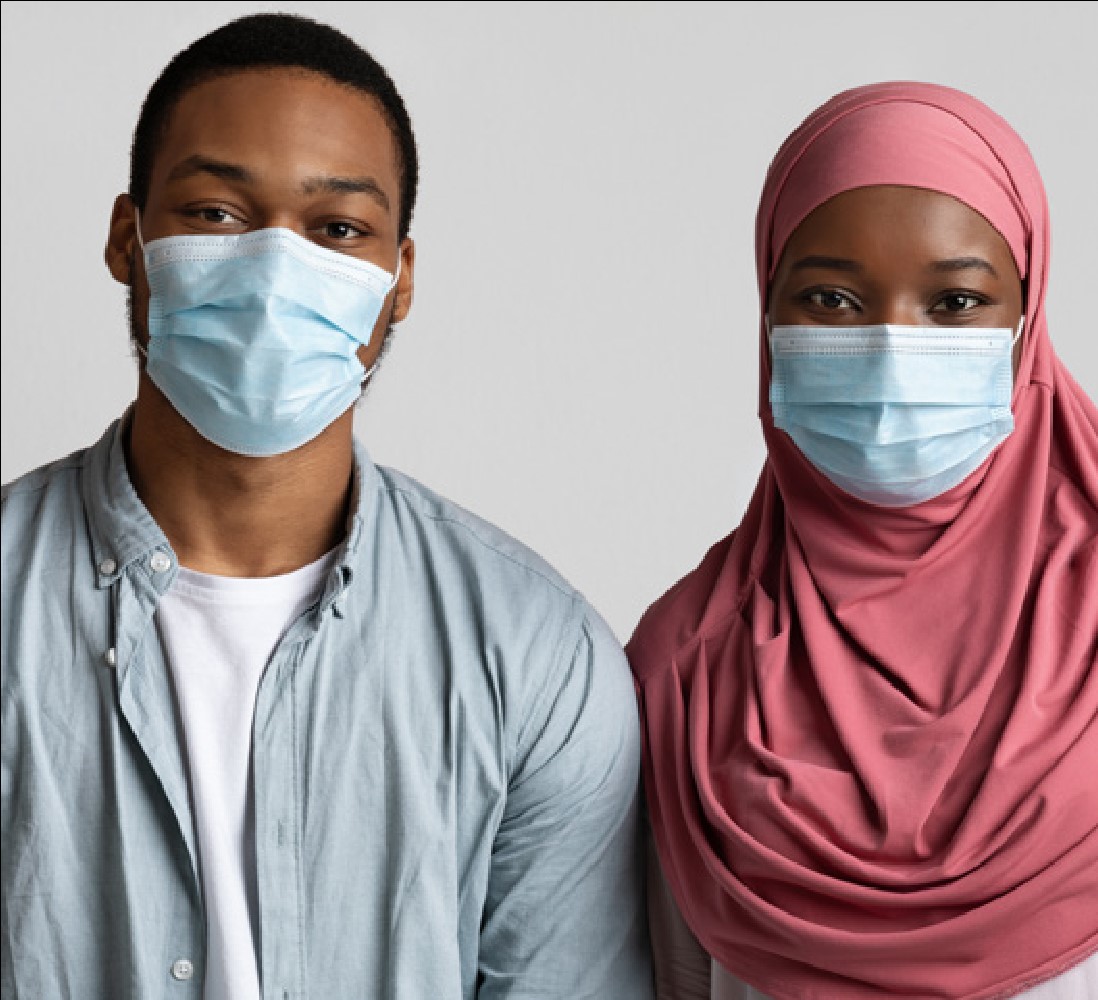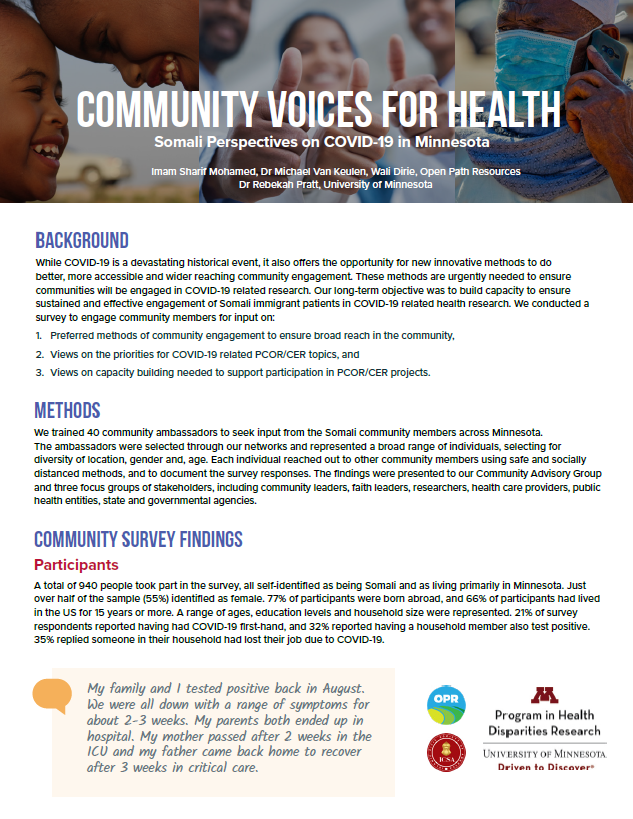Community Voices for Health
Community Voices for Health: Somali Community Perspectives on COVID-19

While COVID-19 is a devastating historical event, it also offers the opportunity for new innovative methods to do better, more accessible and wider reaching community engagement. These methods are urgently needed to ensure communities will be engaged in COVID-19 related research. Our long-term objective was to build capacity to ensure sustained and effective engagement of Somali immigrant patients in COVID-19 related health research. We conducted a survey to engage community members for input on:
- Preferred methods of community engagement to ensure broad reach in the community,
- Views on the priorities for COVID-19 related PCOR/CER topics, and
- Views on capacity building needed to support participation in PCOR/CER projects.
We trained 40 Somali ambassadors to seek input from the Somali community members across Minnesota. The ambassadors were selected through our networks and represented a broad range of individuals, selecting for diversity of location, gender and, age. Each individual reached out to other community members using safe and socially distanced methods, and to document the survey responses. The findings were presented to our Community Advisory Group and three focus groups of stakeholders, including community leaders, faith leaders, researchers, health care providers, public health entities, state and governmental agencies.
Community Survey Findings
A total of 940 people took part in the survey, all self-identified as being Somali and as living primarily in Minnesota. Just over half of the sample (55%) identified as female. 77% of participants were born abroad, and 66% of participants had lived in the US for 15 years or more. A range of ages, education levels and household size were represented. 21% of survey respondents reported having had COVID-19 first-hand, and 32% reported having a household member also test positive. 35% replied someone in their household had lost their job due to COVID-19.
Survey participants were asked if they had been asked for their input on COVID-19 by any organization or institution and 23% (n=194) indicated they had been asked for their views and 77% (n=653) said they had not.
Survey participants were asked if they felt it was important that Somali community members were asked their views on COVID-19, and 82% (n=674) said it was, and 18% (n=144) said it was never asked before this survey.
"I believe everyone’s ideas and views are important. I also believe I can make a change in my community. I will try my best to bring in ideas and feedback which will help my neighborhood."
When asked why community engagement was important, respondents described it being important for both raising awareness and to address the needs of the community.
Preferred Methods of Community Engagement
Survey participants were asked to rate their top three ways they felt community engagement could be done during this time of COVID-19. The top three preferred methods were to participate in engagement by phone (n=533), text message (n=367) and socially distanced in person (n=227).
"I think that the government needs to hear our perspectives, so that they can be taken into action to help this pandemic."
Survey respondents were asked who they wanted to hear the views of the community. The answers fell into the following categories:
- The community
- Healthcare Systems and providers
- Government agencies
Building Confidence in Community Engagement
Respondents described four factors that would help with increasing confidence that they were being heard:
1. Demonstrating the impact of engagement: Seeing action and change, including in healthcare
2. The process of engagement: Proactive outreach, listening, dialogue and partnership
3. Demonstrating representation: A place at the table, trusted connections
4. Commitment to the Community: Supporting the community
Barriers to Community Engagement
Common barriers to participation in community engagement.
- Not feeling listened to.
- Community perceptions of COVID-19.
- Lack out outreach.
- Not having a role in decision making.
- Lack of trust.
Survey participants were provided with a list of 14 different topics relating to COVID-19, which were identified in collaboration with the Community Advisory Group. Each participant could chose up to five topics they felt were the most important priorities for future research relating to COVID-19. The top three topics considered a priority for future research in relation to COVID-19 were:
- The care provided to Somali patients with COVID-19
- Ways to encourage prevention of COVID-19
- Experiences of racism in the health system in seeking help for COVID-19
Of this group of participants, it was the first time participating in research for 84% (n=648) of people. Participants were asked if they would be interested in continuing to participate in research in the future, and 30 (n=responded yes, and 39% responded maybe.
Survey participants described what would help encourage or support them in participating in research. Having a trusted connection to someone involved in the research was seen as helpful (27%, n=302), as was being paid for their time (23%, n=262) and it being a topic someone cared about (22%, n=243). Additionally having some training in research was also seen as helpful (21%, n=233). Fewer respondents felt ready to participate immediately in research (5.3%, n=60).
"I would share my experience in any topic to bring awareness, understanding and solutions. I do believe conducting research is important and necessary to develop understanding and problem solving."
Conclusions
- The Somali community in Minnesota is very interested in culturally-based supports that provide opportunities to participate in community engagement when it is presented in a culturally relevant, trusted way.
- There was a strong directive from the community to build trust and engage in a sustained dialogue, partnership and relationship with health systems and policy makers.
- This community based survey showed that even during a pandemic, we can be creative in reaching a diverse group of community members.
- Community engagement activities with the Somali community during COVID-19 has been challenging for agencies.
- Survey respondents shared their priorities for COVID-19 related research topics, and that prevention of COVID-19, the care received and the impact of racism are top priorities.
- Addressing barriers such as communication challenges, trust, and the experience of racism can help to build and grow the trust needed for engagement.
- This study reached a wide range of Somali community members across Minnesota. The community is diverse and there are a range of views and experiences influenced by many factors, including age, gender, education and life circumstances.
- There is a need to develop cultural bridges that can build common understanding.
Principal Investigators
Rebekah Pratt, PhD
Experts@Minnesota Profile
Imam Sharif Mohamed, Multi-PI
Open Path Resources and Dar al Hijrah Mosque
Co-Investigators/ Collaborators
Michael Van Keulen, PhD
Open Path Resources
Wali Dirie
Open Path Resources
